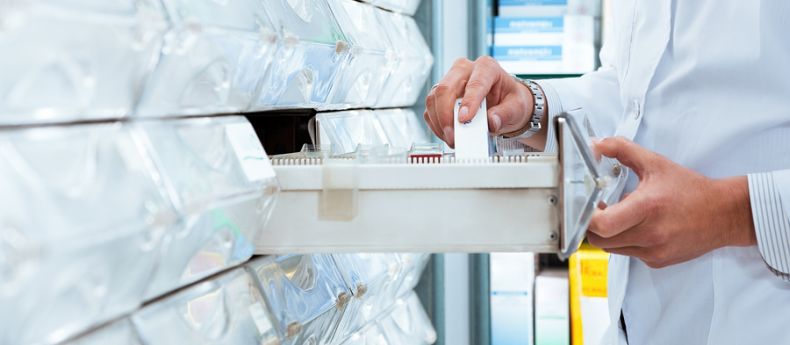
A Look Behind the UFH Pharmacy Doors
Derrick* was a long way from home. He was traveling abroad in Beijing for business when he started experiencing severe chest pains — a reoccurring problem. By the time he sought treatment at Beijing United Family Hospital (BJU), the United Family Healthcare (UFH) network’s flagship hospital, he was under severe distress and unable to communicate with the nursing staff.
Since he was traveling, he had brought many of his medications with him. The problem? None of them were kept in their original packaging.
Enter the UFH Pharmacy team. They called his family and interviewed them about the medications Derrick had been taking – part of a UFH service called “medication reconciliation.” Medication reconciliation is a crucial UFH Pharmacy process that helps our pharmacists provide superior care for our patients. Reviewing each hospitalized patients’ medication, including health supplements, to ensure accurate and comprehensive information and communicated across transitions of care is a service unique to UFH in China.
The UFH Pharmacy mission is to provide “quality patient care by optimizing medication use and ensuring safety.” This mission can be divided into the following six critical steps of medication management, which the UFH Pharmacy follows to give our patients the very best in international-standard pharmaceutical care.
1) Procurement – Getting the drugs
UFH cooperates with Chinese government regulations regarding the procurement of our pharmaceuticals. We maintain a comprehensive formulary, or list of medications, for UFH physicians to prescribe.
How does the UFH Pharmacy team choose what goes into the formulary? The decision is based on 1) evidenced based efficacy,
2) safety and 3) cost effectiveness.
If a UFH physician wants to add medication to the UFH formulary, they must get approval from the UFH Pharmacy and Therapeutic Committee, a group of UFH clinical personnel that meets six times a year. We also compare the suggested medication with others in its class in our formulary as a further safety precaution. Because UFH prefers to use the best drugs available, we often work with joint-venture or imported brands whose manufacturing and testing practices ensure high quality pharmaceutical products. For certain products like vaccines, we even go to the factory floor to examine their production line. This is an additional independent verification step to ensure pharmacy products are safe and reliable.
2) Storage – Moving and keeping the drugs
Quality is compromised if a medication is mishandled, so appropriate storage and transportation of medications is crucial. That is why UFH only works with suppliers that apply the best logistics and quality control procedures available. For medications, shelf life is a big concern. UFH Pharmacies don’t keep a lot in storage, only enough stock to last two to four weeks. This way, we ensure that we are giving our patients the best quality medications possible.
How does UFH keep stock from dipping too low while ensuring quality? UFH keeps its formulary in a computerized network to monitor our stock. If our stock starts running low, we have an established network of suppliers and hospitals, including those within the UFH network, that can deliver the items we need within two hours.
3) Ordering – Requesting the drugs
How does UFH protect against adverse drug reactions or ordering the wrong medications? UFH utilizes an integrated healthcare information system, called TrakCare, which keeps track of our patients’ health. Accessible across the UFH network, this clinical intelligence alerts UFH staff to possible adverse drug interactions and allergies patients may have.
What if you, like Derrick, routinely travel throughout China? Or, what if you live in Shanghai, and regularly visit Shanghai United Family Hospital and Clinics (SHU), but visit a UFH facility on a business trip to Tianjin? What was that exact brand of blood pressure medication you were taking? How severe was your reaction to penicillin? With TrakCare, the staff at Tianjin United Family Hospital (TJU) would be able to access your information, perform medication reconciliation, and give you the correct dosage of the medications you need.
In China, over-prescribing is an issue. Many hospitals rely on pharmaceutical revenues to operate; as much as 50% of a hospital’s revenue in China can come from the pharmacy. Over-prescribing is as much about effectiveness as it is about safety– taking too much unnecessary medication just will not make you heal faster. At UFH, the pharmacy accounts for about 12% of our total revenue. The Pharmacy team makes sure to only give medications at dosages that are indicated and will be effective for all our patients.
Antibiotic over-prescription is also a major issue in China. A common practice in many Chinese hospitals is to give an antibiotic IV drip, whether antibiotics are merited or not. Over-utilization of antibiotics can lead to antibiotic ineffectiveness and the evolution of drug-resistant bacteria. Therefore, in the interest of public health, UFH established an Antibiotic Stewardship Team, a surveillance program that ensures the proper use of antibiotics throughout the UFH network. UFH routinely has much lower rates of antibiotic usage than do many Chinese hospitals. The Chinese government recommends antibiotic usage in less than 20% of outpatient activity and less than 60% of inpatient activity. In June 2013, BJU had a 5.5% rate of antibiotic usage in outpatient activity and a 35% rate in inpatient activity.
4) Preparing and dispensing – Giving the drugs
The UFH Pharmacy team employs various measures to ensure that medications are prepared and dispensed accurately and efficiently. Prescriptions are double checked, if not triple checked before going to patients. Safety alerts are in place to warn pharmacy staff about the look alike sound alike drug pairs as well as high alert medications.
In our Beijing and Shanghai hospitals, all intravenous IV medications are prepared by trained pharmacy technicians in clean rooms similar to operating theatres and under strict protocols. We also standardize the IV orders so that the best dilution fluid and concentration are being utilized. This process not only provides safe quality IV products but also frees our nurses to care for their patients.
5) Administration – Managing the drugs
Everything about how the medication should be administered – e.g. how much, how often – is documented in TrakCare, so that patients will receive accurate dosages of medications endorsed by their UFH care team, no matter which UFH facility they visit.
6) Monitoring – Checking on the drugs
Because safety is the UFH Pharmacy team’s primary concern, UFH monitors each patient for side effects and efficacy of the medication treatment. UFH pharmacies also have a comprehensive surveillance system that will monitor for medication related events including drug recalls from manufacturers.
At UFH, our pharmacists are part of our patients’ –like Derrick’s—multidisciplinary healthcare team. We are here to answer your questions and help you feel confident about the medications you take. Both BJU and SHU pharmacies are open 24 hours a day, seven days a week, to give you around-the-clock access to your medications. For environmental safety, UFH pharmacists are also happy to help you safely dispose of any extra or expired medications you may have.
*Patient name changed to protect confidentiality.
Copyright United Family Healthcare 2014 All right reserved - 京卫网审[2014]第1927号 - 京ICP备13017554号-4






